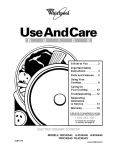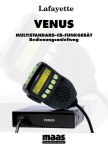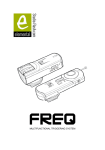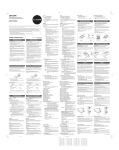Download Vello Freewave User manual
Transcript
FREEWAVE USER MANUAL 1 INTRODUCTION Thank you for choosing the Vello FreeWave Wireless Remote Shutter Release. This device triggers your camera wired or wirelessly, allowing you to trip the shutter without disturbing the camera. It’s ideal for taking pictures of subjects that are difficult to approach, such as wildlife. It also eliminates vibrations caused by pressing your camera’s shutter release button during macro, close-up, or long-exposure photography. The two-second delay function is great for self-portraits. Unlike infrared remotes, which won’t work if the receiver is not in direct line-of-sight of the transmitter, the FreeWave uses radio frequencies. Radio waves can pass through and around objects such as walls, windows, and floors. You can even trigger your camera around corners. The FreeWave can transmit over 16,000,000 possible channels, and there are no dip switches to set. The device configures with the press of a button. 2 Your Vello FreeWave Wireless Remote Shutter Release kit contains: Wireless RF Receiver, Wireless RF Transmitter, Camera Release cable, Battery, Lanyard, and Clip. KEY FEATURES Smart Code: 16,000,000 possible radio channels. No dip switches to set. One transmitter can trigger multiple receivers. Extended Range: up to 100m (320 ft.) Dual-Function Release: Press halfway to focus; press full to trigger shutter. Delayed Release: Two-second delay function gives you extra time to get into position. Multi-function: Trigger your camera wirelessly or wired. Wired triggering works even if the battery in the receiver is dead or missing. Multi-exposure: Take multiple shots with one press of the trigger. Versatile: One receiver works with dozens of camera models. Just swap out the camera release cable. LED indicators: Confirm pre-focus and exposure during wireless mode. Long Exposure: Control the length of the exposure remotely. 3 SAFETY WARNINGS • There are no user-serviceable parts inside the devices. Do not attempt to disassemble or perform any unauthorized modification. • Do not operate the FreeWave in the presence of flammable gas or vapors. • Do not handle with wet hands or immerse in or expose to water or rain. Failure to observe this precaution could result in fire or electric shock. • Keep out of the reach of children. This device contains small parts which may pose a choking hazard. • Observe caution when handling batteries. Batteries may leak or explode if improperly handled. Use only the batteries listed in this manual. Make certain to align batteries with correct polarity. • Do not use or leave the devices in conditions of extreme heat, severe cold, or high humidity. • Batteries are prone to leakage when fully discharged. To avoid damage to the product, be sure to remove the batteries when leaving the product unattended for prolonged periods or when no charge remains. • Dispose used batteries, packaging, and old devices in accordance with appropriate local environmental regulations. 4 • Turn off the camera’s power before inserting or removing the remote cord. FEATURES DIAGRAM interchangeable shutter release cable antenna confirmation LED confirmation LEDs Transmitter Receiver shutter release button shutter release button shot selector hold/ready button power/set button lanyard loop battery bay 5 POWERING UP Turning ON the Receiver: Press and hold the Set/Power button until the red LED comes on. The Receiver turns off the same way. Press and hold the Set/Power button until the red LED turns off. Turning ON the Transmitter: There is no need for a power button on the Transmitter. The Transmitter is always ready to fire and uses power only when you press the shutter release button. Press and hold the Set/Power button for ~3 seconds to power up the Receiver. 6 SETTING THE SMART CODE The FreeWave supports 16,000,000 possible radio channels. The units have been synchronized at the factory, so your system can work right out of the box. However, to maximize signal quality and range, it’s best to use the Smart Code technology to sense the “quiet” frequencies in your environment and re-synchronize on that channel. Multiple receivers can be programmed to respond to a single transmitter, allowing you to trigger several cameras with a single transmitter. To synchronize the Transmitter and Receiver(s): 1. Turn on the Receiver(s) by pressing and holding the Set/Power button until the left red LED comes on. 2. Set the Receiver(s) to Ready and the Transmitter to Single/Bulb. 3. Press the Set/Power button on the Receiver(s) five times. The right LED will begin blinking red. 4. Fully depress the shutter button on the Transmitter. The right LED on the Receiver(s) will blink and then turn off. 7 5. Your Smart Code is set and will remain set to this code even after the Receiver is turned off. To test for synchronization, press the shutter release button on the Transmitter. If you press halfway, the right LED on the Receiver will light green. Pressing all the way will turn the LED red. If you don’t see this confirmation, re-synchronize the units. MOUNTING THE RECEIVER If using the FreeWave wirelessly, mount the Receiver on your camera’s hot shoe, facing forwards or backwards. If your camera’s hot shoe is in use, you can use an optional straight bracket accessory (Vello CB-600) to attach the Receiver to your camera. With your camera and Receiver OFF, connect the shutter release cable’s sub-mini plug end to the Receiver and the other end to your camera’s shutter release jack. Power up your camera and Receiver. 8 SINGLE SHOTS | WIRELESSLY 1. Turn on the Receiver by pressing and holding the Set/Power button until the left red LED comes on. 2. Set the Receiver to Ready and the Transmitter to Single/Bulb. 3. Press the Transmitter’s shutter release button halfway to wake or focus your camera (if set to Auto Focus). The LED will turn green. 4. Fully depress the shutter button on the Transmitter. The LED will turn red and the shutter will be triggered. 9 TWO SECOND DELAY / WIRELESSLY 1. Turn on the Receiver by pressing and holding the Set/Power button until the left red LED comes on. 2. Set the Receiver to Ready and the Transmitter to 2 Sec Delay. 3. Press the Transmitter’s shutter release button halfway to focus the camera (if set to Auto Focus). The LED will turn green. 4. Fully depress the shutter button on the Transmitter. The LED will turn red and the shutter will be triggered after a two second delay. 10 CONTINUOUS MODE / WIRELESSLY 1. Turn on the Receiver by pressing and holding the Set/Power button until the left red LED comes on. 2. Set the Receiver to Ready and the Transmitter to Cont. 3. Press the Transmitter’s shutter release button halfway to focus the camera (if set to Auto Focus). The LED will turn green. 4. If your camera is set to Single Shot Mode, a full press of the Transmitter’s shutter button will trigger the camera to take five photos. If your camera is set to Continuous Mode, a full press of the Transmitter’s shutter button will trigger the camera to take continuous photos until you release the shutter button. 11 To lock in Continuous Mode: Set the Receiver to Ready and the Transmitter to Single/Bulb. Set your camera to Continuous Mode. Fully press the Transmitter shutter button for four seconds. The camera will continue to take photos until you press the shutter button again. BULB MODE (LONG EXPOSURE) | WIRELESSLY 1. Set your camera to Bulb mode. 2. Turn on the Receiver by pressing and holding the Set/Power button until the left red LED comes on. 3. Set the Receiver to Ready and the Transmitter to Single/Bulb. 5. Fully depress the Transmitter’s shutter button for three seconds until the red LED on the Transmitter turns off. The shutter will remain open until you half-press or full-press the shutter button again. 4. Press the Transmitter’s shutter release button halfway to wake or focus the camera (if set to Auto Focus). The LED will turn green. 12 SINGLE SHOTS | WIRED The FreeWave Receiver can also be used as a wired remote. With your camera and receiver OFF, connect the shutter release cable’s miniplug end to the Receiver and the other end to your camera’s shutter release jack. Power up your camera. The Receiver does not need to be on, but because the Receiver does not need power in wired mode, the LEDs will not light. 1. Turn on the Receiver by pressing and holding the Set/Power button until the left red LED comes on. 2. Set the Receiver to Ready. 3. Press the Receiver’s shutter release button halfway to wake or focus your camera (if set to Auto Focus). The confirmation LED will not display, so be sure to manually focus or allow the camera to Auto Focus without confirmation. 4. Fully depress the shutter button on the Receiver. The shutter will be triggered. Moving the Receiver switch to Hold will also trigger the shutter. 13 CONTINUOUS MODE | WIRED 1. Power up your camera and set it to Continuous Mode. The Receiver does not need to be on, but because the Receiver does not need power in wired mode, the LEDs will not light. 2. Set the Receiver switch to Ready. 3. Press the shutter release button halfway to wake or focus the camera (if set to Auto Focus). The confirmation LED will not display, so be sure to focus manually or allow the camera to Auto Focus without confirmation. 4. A full press of the shutter button will trigger the camera to take continuous photos until you release the shutter button. 14 You can also take continuous photos by moving the Receiver switch to the Hold position. The camera will take photos until you move the switch back to the Ready position. BULB MODE (LONG EXPOSURE) | WIRED 1. Power up your camera and set it to Bulb Mode. The Receiver does not need to be on, but because the Receiver does not need power in wired mode, the LEDs will not light. 2. Set the Receiver to Ready. 3. Press the Receiver’s shutter release button halfway to wake or focus the camera (if set to Auto Focus). The confirmation LED will not display, so be sure to focus manually or allow the camera to Auto Focus without confirmation. 4. Fully depress the Receiver’s shutter button to take the shot. The shutter will stay open as long as the shutter button is pressed. Sliding the Receiver switch to the Hold position will keep the shutter open until the switch is returned to the Ready position. 15 © Fotoquintero CHANGING THE BATTERIES The FreeWave Receiver uses a CR2 3V battery which should last through approximately 20,000 triggers. It is easy to change. Slide open the battery door on the end of the unit. The FreeWave Transmitter uses a 23A 12V battery, which should last three years under normal conditions. To replace the battery, release two screws on the back of the unit to access the battery. Be sure to line up the catches on the selector switch before closing. 16 CAMERA RELEASE CABLES The FreeWave includes a camera release cable that enables the remote to work with certain models of cameras, but just by changing the camera release cable, a single FreeWave Receiver can work with many other cameras as well. At right are models of Vello Camera Release Cables for FreeWave and the cameras they support. For these cables, and cables for other camera models, check with your Vello dealer. RCC-C2 – Canon EOS 10D / 20D / 30D / 40D / 50D / 5D / 5D Mark II / 5D Mark III / 7D / 1D / Mark II / Mark IIn / Mark III /Mark IV / 1DS / Mark II/ Mark III / 1D X RCC-N1 – Nikon D1 / D1H / D1X / D2 / D2H/ D2Hs / D2X / D2XS / D3 / D3X / D3S / D4 / D200 / D300 / D300s / D700 / D800 / D800E Fuji S3pro / S5Pro Kodak DCS-14N RCC-C1 – Canon EOS 30 / 33 / 50 / 60D / 300 / Digital Rebel (300D) / XT (350D) / XTi (400D) / XSi (450D) / XS (1000D) / T1i (500D) / T2i (550D) / T3 (1100D) / T3i (600D) / Powershot G10 / G11 / G12 / G1 X Contax N / 645 Pentax K100D / K110D / K200D / K10D / K20D / K-5 / K-7 / *ist DS / DS2 / DL2 / DL / D Sigma SD1 Samsung GX-1S / GX-1L / GX-10 / GX-20 / NX Series RCC-S1 – Sony Α100 / Α200 / Α300 / Α350 / Α500 / Α550 / Α560 / Α580 / Α700 / Α850 / Α900 / SLT Α33 / A35 / Α55 / A57 / A65 / A77 RCC-O1 – Olympus E400 /E410 / E420 / E450 / E510 / E520 / E620 / E-P2 / E-P3 / E-PL2 / E-PL3 / E-PM1 / SP-510UZ / SP-550UZ / SP-560UZ / SP-570UZ / XZ-1 RCC-N3 RCC-C2 RCC-S1 RCC-O2 – Olympus E-1/ E-3/ E-5 RCC-O1 RCC-N1 RCC-N3 – Nikon D70s / D80 RCC-N2 – Nikon D90 / D3100 / D3200 / D5000 / RCC-N2 RCC-C1 D5100 / D7000 RCC-P1 RCC-P1 – Panasonic DMC-L1 / DMC-L10/ DMC-G1/ DMC-GF1 / DMC-GH1 / DMC-GX1/ DMC-G2 / DMC-GH2 / DMC-G3 / RCC-O2 DMC-G10 / DMC-FZ100 / DMC-FZ150 SPECIFICATIONS | TROUBLESHOOTING Power Battery Life Smart Code Channels Range Frequency Confirmation LEDs Shutter Modes Transmitter Receiver 12V / 23A 3V / CR2 up to 3 years approx. 20,000 triggers 16,000,000 possible codes 100m (320 ft) with no obstructions 433 MHz 2 color single shot, 2-second delay, continuous, & bulb 18 Troubleshooting Problems with the FreeWave can be traced to the following most common causes. Perform the following steps to diagnose the problem: • Check that the shutter release cable is in good condition and is properly connected. • Make sure that the Receiver switch has not been set to Hold. • Remove the battery from the Receiver, reinsert it, and reset the Smart Code. KEY FCC FEATURES COMPLIANCE This equipment generates, uses, and can Smart Code: 16,000,000 possible radiate frequency energy, and ifto radioradio channels. No dip switches notset. installed and used in accordance One transmitter can trigger withmultiple the instructions, receivers.may cause harmful interferenceRange: to radioupcommunications. Extended to 100m This(320 equipment has been tested and ft.) found to comply with the limits for a Multi-function: Trigger your camera Class B digital device pursuant to Part wirelessly wired. Wired 15 of the FCCor Rules. These limits are triggering if the battery designated to works provideeven reasonable in the receiver dead or missing. protection against is harmful interference Versatile: Oneinstallation. receiver works with in a residential dozens camera models. Just swap There is noofguarantee that interference out the camera release cable. will not occur in a particular installation. Dual-Function If this equipment Release: does causePress harmful halfway totofocus; full to trigger interference radiopress or television shutter.which can be determined by reception, turning the equipment ON or OFF, the Delayed Release: Two-second delay userfunction is encouraged to extra try to time correct the gives you to get interference by one or more of the into position. following measures: Multi-exposure: Take multiple shots 1. Reorient or relocate the with one press of the trigger. receiving antenna; Long length of 2. Exposure: Increase theControl distancethe between thethe exposure remotely. equipment and the receiver. LED indicators: Confirm pre-focus This device complies with Part 15, and exposure mode. Subpart B, Class Bduring of thewireless FCC Rules. 19 Operation is subject to the following two conditions: 1. This device may not cause harmful interference; 2. This device must accept any interference received, including interference that may cause undesired operation. Any changes or modifications (including the antennae) made to this device that are not expressly approved by the manufacturer may void the user’s authority to operate the equipment. Limited One-Year Warranty Vello provides a limited warranty that this product is free from defects in materials and workmanship to the original purchaser under normal use for a period of one (1) year from the original purchase dateor thirty (30) days after replacement whichever occurs later. Vello’s responsibility with respect to this limited warranty shall be limited solely to repair or replacement, at its option, of any product which fails during normal consumer use. This warranty does not extend to damage or failure which results from misuse, neglect, accident, alteration, abuse, improper installation or maintenance. EXCEPT AS PROVIDED HEREIN,VELLO MAKES NEITHER ANY EXPRESS WARRANTIES NOR ANY IMPLIED WARRANTIES, INCLUDING BUT NOT LIMITED TO ANY IMPLIED WARRANTY OF MERCHANTABILITY OR FITNESS FOR A PARTICULAR PURPOSE. To obtain a replacement during the time of this warranty please return the defective item with proof of purchase along with an RMA number to the place of purchase. This warranty gives you specific legal rights, and you may also have other rights which vary from state to state. www.vellogear.com © Copyright 2011 Gradus Group 20































